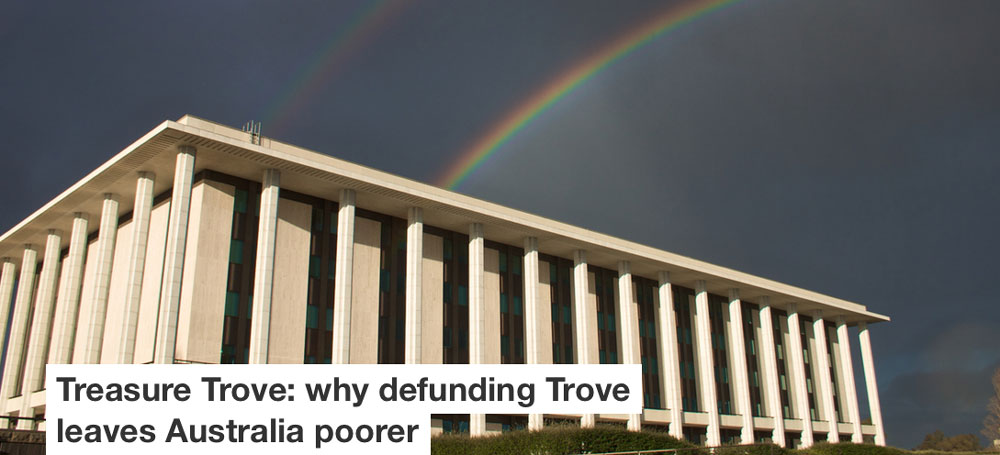 Mike Jones, University of Melbourne and Deb Verhoeven, Deakin University. This article was originally published on The Conversation.
Mike Jones, University of Melbourne and Deb Verhoeven, Deakin University. This article was originally published on The Conversation.
All swashbuckling pirates (and movie producers) know that if you want to find the treasure buried beneath the elusive X you first need a map. A charred fragment is no good: fortune only comes to those who hold enough pieces to follow the trail.
The National Library of Australia’s Trove service is that map for anyone wanting to navigate the high seas of information abundance. (You don’t even need to be a pirate.)
But our information plundering days may soon be over. Recently announced “efficiency dividends” mean that aspects of the Trove service will be scratched.
The news that Trove will face cuts has led to an outpouring of support on social media, with several thousand tweets using the #fundTrove hashtag.
So what exactly will we lose?
Trove pulls together metadata and content from multiple sources into one platform to make finding what you are looking for an efficient and successful experience.
As of February 25 2016, this includes information on over 374,419,217 books, articles, images, historic newspapers, maps, music, archives, datasets and more, expressing the extraordinarily rich history of Australian culture.
If, as someone interested in museums, I am looking for information on Sir Frederick McCoy, inaugural director of the National Museum of Victoria, a single Trove search reveals not just books and articles.
I’ll find information on archival collections at the State Library of Victoria and the Royal Historical Society of Victoria, biographical entries from the Australian Dictionary of Biography and the Encyclopedia of Australian Science, digital photographs, transcribed newspaper obituaries and images of documents such as a Geological Survey of Victoria map to which McCoy contributed.
Distributed content is available within seconds. The benefits to researchers, local and family historians, and the Australian community as a whole, is immense, resulting in over 70,000 unique visitors a day.
Yet, as The Sydney Morning Herald reported on Monday, staff have been told the federal government’s “efficiency dividend” will have a “grave impact” on the National Library. Aside from inevitable staff cuts,
The library will also cease aggregating content in Trove from museums and universities unless it is fully funded to do so.
This is the information equivalent to leaving money, or treasure, on the table.
Making Australia’s existing investment in information resources freely and efficiently available is not just a self-evident public good in terms of equality of access. The democratisation of information has clear benefits for innovation and the Turnbull government’s “ideas boom”.
Trove is a key piece of information infrastructure for many professionals, and this wealth of material isn’t behind a paywall or subscription service. There’s no requirement that users prove they are “bona fide” researchers (whatever that may mean).
It’s accessible to anyone with an internet connection; and the sources it draws on include more than the usual suspects. There’s content from small institutions and large, community collections as well as state-funded libraries, museums and archives.
In a sense Trove has been a revolutionary experience for those of us who rely professionally on access to high-quality information. Once our problem was that there was just too little to go on. Now there’s far too much.
Contrary to the myth of the lone researcher who loves spending hours scouring paper archives and libraries to discover “buried” or “lost” knowledge, humanities research isn’t primarily about the hunt for content. It’s about analysing, processing, interpreting, relating and synthesising useful content that has been found.
By dramatically reducing the time spent on the trail of content, Trove users spend less time hunting for the booty and more time working with the spoils.
Trove not only aggregates content, it provides sophisticated search capability to help narrow down thousands of results. It’s a focal point for the diverse community who help organise, correct and improve the information it contains.
For people and organisations with some coding skills there are also opportunities to harvest and process content via an API (application programming interface) to reveal new ways of looking at our shared heritage.
The Trove platform supports 21st-century innovation and agile practice. As a result, it has become essential and internationally renowned infrastructure for distributed, collaborative and responsive research into Australian society and culture.
As a past manager of Trove, Tim Sherratt, pointed out on Wednesday,
Trove is not going to be suddenly turned off.
But its relevance relies on constantly growing the knowledge and content it contains.
If the National Library puts Trove to the sword as a result of the government’s swashbuckling cuts, this innovative stash of content may end up dispersed and buried again, taking Australia off the map. That would definitely leave us poorer, an information desert island in an increasingly interconnected world.
![]() ———————————————————————————
———————————————————————————
Mike Jones, Consultant Research Archivist, University of Melbourne and Deb Verhoeven, Professor and Chair of Media and Communication, Deakin University
This article was originally published on The Conversation. Read the original article.
Please note the header about Malcolm Turnbull is mine and not used by The Conversation for their original post.